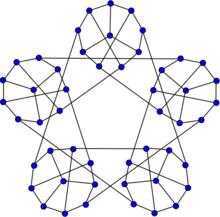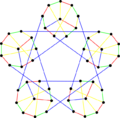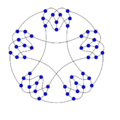Szekeres snark
From HandWiki
Short description: Szekeres snark with 50 tops and 75 edges
| Szekeres snark | |
|---|---|
 The Szekeres snark | |
| Named after | George Szekeres |
| Vertices | 50 |
| Edges | 75 |
| Radius | 6 |
| Diameter | 7 |
| Girth | 5 |
| Automorphisms | 20 |
| Chromatic number | 3 |
| Chromatic index | 4 |
| Book thickness | 3 |
| Queue number | 2 |
| Properties | Snark Hypohamiltonian |
| Table of graphs and parameters | |
In the mathematical field of graph theory, the Szekeres snark is a snark with 50 vertices and 75 edges.[1] It was the fifth known snark, discovered by George Szekeres in 1973.[2]
As a snark, the Szekeres graph is a connected, bridgeless cubic graph with chromatic index equal to 4. The Szekeres snark is non-planar and non-hamiltonian but is hypohamiltonian.[3] It has book thickness 3 and queue number 2.[4]
Another well known snark on 50 vertices is the Watkins snark discovered by John J. Watkins in 1989.[5]
Gallery
-
The chromatic number of the Szekeres snark is 3.
-
The chromatic index of the Szekeres snark is 4.
-
Alternative drawing of the Szekeres snark.
References
- ↑ Weisstein, Eric W.. "Szekeres Snark". http://mathworld.wolfram.com/SzekeresSnark.html.
- ↑ Szekeres, G. (1973). "Polyhedral decompositions of cubic graphs". Bull. Austral. Math. Soc. 8 (3): 367–387. doi:10.1017/S0004972700042660.
- ↑ Weisstein, Eric W.. "Hypohamiltonian Graph". http://mathworld.wolfram.com/HypohamiltonianGraph.html.
- ↑ Wolz, Jessica; Engineering Linear Layouts with SAT. Master Thesis, University of Tübingen, 2018
- ↑ Watkins, J. J. "Snarks." Ann. New York Acad. Sci. 576, 606-622, 1989.
 |



